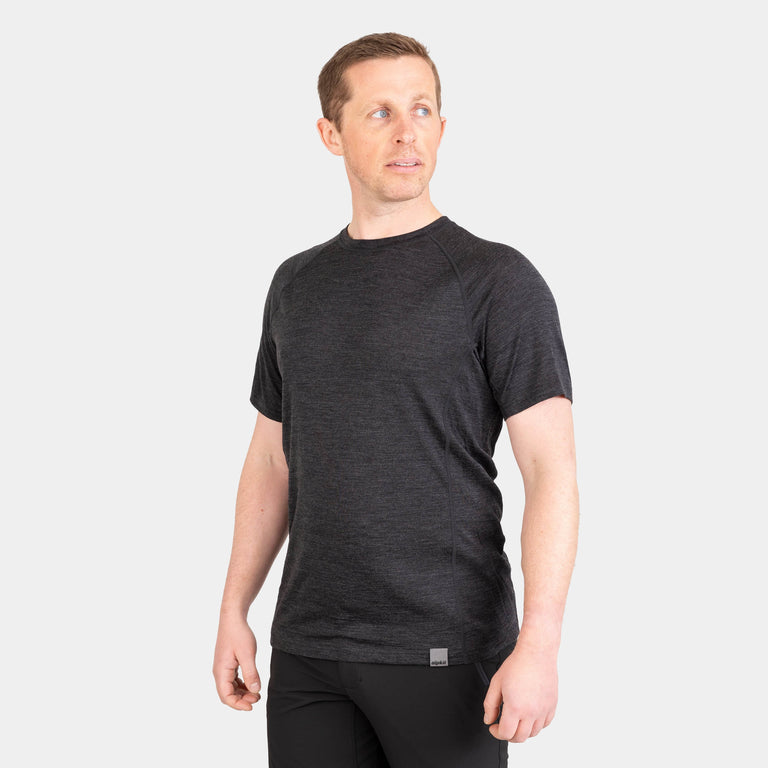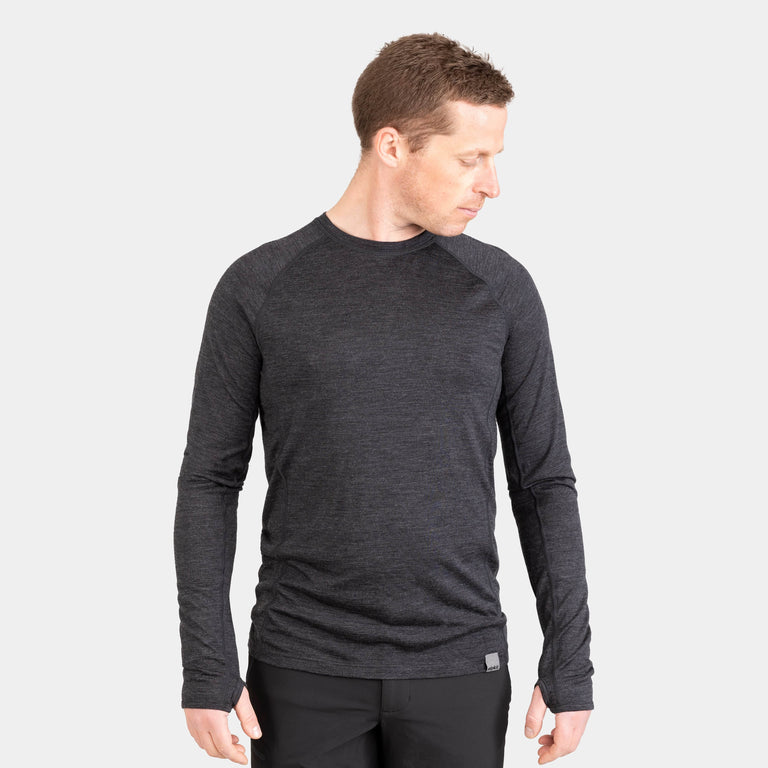
We love merino wool. It's often called natures performance fabric .… but what actually is merino wool? Why is it so much better than regular wool? What are the benefits and how are its qualities so different from synthetic fibres? We followed Designer Ronnie around the
Merino wool is a fine, soft, natural fibre and it's a wonderful fabric to wear next to your skin. In this guide we talk about the benefits of merino wool, how it's different to other wools and how we care for animals when we get our merino.
- What are the benefits of merino wool?
- How is merino wool different to regular wool?
- What does non-mulesed mean?
What are the benefits of merino wool?
- It's temperature regulating - it keeps you warm when you're cold and cool when you're hot
- It wicks moisture away from your skin quickly so you'll stay dryer
- It's anti-microbial
- You don't need detergent to wash it
- It's biodegradable (no micro-plastics in merino!)
- It smells good for longer so you don't have to wash it so often
Merino gives a really soft feel (none of the prickliness usually associated with wool), which is what makes it so nice to wear next to the skin. The finer fibres also trap more air within the structure of the fabric, making it a great insulator.
Wool is capable of absorbing moisture into the fibre itself (up to 35% of its own weight). This holds the moisture away from your skin so it's comfortable to wear even when you’re working up a sweat.
Where synthetic fibres rely on mechanically transporting moisture through the fabric, wool works at the fibre level to keep you comfortable across a wider range of temperatures. As a result, merino wool can keep you warm when it is cold and cool when it is hot.
How is merino wool different to regular wool?
The main difference between merino wool and regular wool is the fineness of the fibres. This is measured in microns; anything finer than 24 microns is classified as merino, and anything thicker isn’t merino. These fine merino fibres come from specific breeds of sheep that have particularly fine wool (in fact, it’s around 1/10th of the width of human hair!) and it's the fact that the fibres are fine that makes the material so soft.
Fine fibres also mean that merino is flexible so it's great to move in. That's one of the reasons merino base layers and merino socks are so comfortable.
Merino wool also generally dries more quickly than regular wool. Again, this is down to the wonderfully fine fibres that don't hold onto moisture for so long.
What does non-mulesed mean?
Mulesing is a method employed by some farmers to prevent the loss of sheep to flystrike. It involves removing strips of skin from around the sheep’s backside, to prevent the wool in that area getting dirty and attracting the insects that cause the infection.
All our merino wool comes from non-mulesed sheep.
We don’t like mulesing, especially since there are much kinder ways to protect sheep from insects (such as regular shearing around the back). The kinder methods are a little more expensive, but we believe it’s worth it for happier sheep.
We source all our merino from non-mulesing farms so you can rest assured that any merino product you buy from Alpkit came from a sheep that got a regular clean and trim rather than the cheaper, grim alternative.
![Aztec Short Sleeve [Mens]](http://us.alpkit.com/cdn/shop/files/mens-aztec-short-sleeve-2025-outer-space.jpg?v=1765392847&width=768)
![Aztec Short Sleeve [Mens]](http://us.alpkit.com/cdn/shop/files/aztec-ss-mens-2025-jasper-1.jpg?v=1765392847&width=768)
![Aztec Long Sleeve [Mens]](http://us.alpkit.com/cdn/shop/files/mens-aztec-long-sleeve-2025-outer-space.jpg?v=1765565687&width=768)
![Aztec Long Sleeve [Mens]](http://us.alpkit.com/cdn/shop/files/aztec-ls-mens-2025-outerspace-3.jpg?v=1765565687&width=768)






![Kepler Boxers [Mens]](http://us.alpkit.com/cdn/shop/files/mens-kepler-boxers.jpg?v=1717536016&width=768)

![Kepler Long John [Mens]](http://us.alpkit.com/cdn/shop/files/mens-kepler-long-black.jpg?v=1717536160&width=768)

![TCAKKEPPAD-NEM-01-kepler padded boxer [mens] black](http://us.alpkit.com/cdn/shop/files/mens-kepler-boxers-paded.jpg?v=1717536270&width=768)
![TCAKKEPPAD-NEM-02-kepler padded boxer [mens] black](http://us.alpkit.com/cdn/shop/files/TCAKKEPPAD-NEM-02-kepler_padded_boxer__5Bmens_5D_black.jpg?v=1717536270&width=768)











![Aztec Long Sleeve [Womens]](http://us.alpkit.com/cdn/shop/files/womens-aztec-long-sleeve-2025-outer-space.jpg?v=1764269683)

![Aztec Short Sleeve [Womens]](http://us.alpkit.com/cdn/shop/files/womens-aztec-short-sleeve-2025-outer-space.jpg?v=1761850496)


![Kepler Boxers [Womens]](http://us.alpkit.com/cdn/shop/files/womens-kepler-boxer-black_661f2289-d6ca-458e-bb3d-67d189c6fc5b.jpg?v=1717536039)
![Kepler Padded Boxer [Womens]](http://us.alpkit.com/cdn/shop/files/womens-kepler-padded-boxer_6988dd8d-8a02-4cec-ae8b-c04248b2afae.jpg?v=1743703277)





